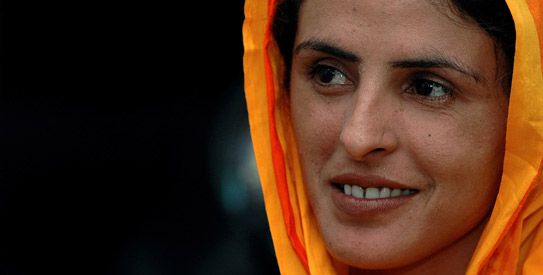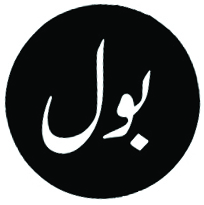I think everyone was worried. Nobody remembers a feminist gathering in which men have been invited but aren’t allowed to speak. There was apprehension among the organizers about male outrage at having to take a back seat, and about whether women would share their experiences in a public forum like this. Sexism in Leftist and Progressive Spaces, a dialogue held in Lahore at Books and Beans on Saturday, defied those expectations and proved itself to be both catharsis and galvinizer. Continue reading “I Talk, You Listen”
Hero
I read the news about judgement in Mukhtaran Mai’s case with the same horror and disappointment that many in Pakistan felt and expressed. It is a terrible thing to see justice undone like this, at the hands of a supposedly victorious, independent judiciary, brought back to the bench through the blood, sweat and aspirations of so many hoping for change in Pakistan. Continue reading “Hero”
All Oppression
It’s been a while. We at Chay Magazine have been reassessing, rethinking, revamping and also resting and recreating as we figure out where and how to take this publication. Much has happened in the months since you last heard from us. Much of it has been horrible, such as the massacre of Ahmadis in Lahore in their own mosques. So now, as we move forward with a new look and some new opportunities, we also possess a new mission.
When we began two years ago, our mission was to talk about that which we do not talk about; not just say “chay” when we mean “chootia” or “chaalaak” or “charya”; not hide behind culture and civility those things that make us human, that are at the core of our being.
We chose sexuality because sexuality is the hardest spoken of and most difficult of challenges to Pakistani society and norms of acceptable behaviour. But we are finding that there are so many things we do not speak openly about, so many symbolic “chay” words that it isn’t enough to pick a niche and stay in it. Not talking about sex and not talking about religious difference are intertwined because we are equally silent in the face of sexual violence and a massacre. What is it that allows us to be up in arms about drawing images to the Prophet, but leaves us silent when a teenage girl in gang-raped in police custody for over three weeks. These silences must have the same root – they are all linked to possessing “sharm” and keeping your head down and not getting involved with things that don’t concern you. They are related in equal measure to occupying a privilege position in society, whether by virtue of money, or gender, or religion, and the fear of being deprived of privileges. In the words of activist poet Staceyann Chin: “all oppression is connected, you dick.”
So this summer, as we being our third year in publication, we say, “bay se Bol.” All oppression is connected and we must bring it all to light.
If you are looking for a place to voice your views, be they on sexuality in specific or the unspeakable in general, Chay Magazine is your platform. We will still and always centre sexuality and our bodies, but we recognize that aside from desire, love and identity, our bodies also experience war and violence and enlightenment and knowledge and God. We wan to talk about all of it. We believe, above all, in conversation.
Write in to chaymagazine AT gmail DOT com and tell us what you want to talk about.
Where Have All the Cowboys Gone?
And by cowboys, I mean straight people.
When we conceived of Chay Magazine, we did not imagine that we would lack for content about heterosexual life – heterosexual love, heterosexual sexuality, marriage, divorce, dating, harassment. We were expecting all of these things. What’s more, we were really worried about finding enough content by or about anyone who wasn’t straight.
Gosh, we were wrong. People are coming at us left, right and centre writing about queer issues, about gender issues, about non-heteronormative love, sociology, health and spirituality. What Chay Magazine is sorely lacking, despite dogged dogging of writers we think could broaden the scope our publication, is a lot of writing about heterosexual sexuality.
We have some, obviously. But have a look at some of the comments, the links to which appear on the right hand sidebar on the homepage. Half of them are engaging with the queer-centred content. The other half are berating us or our writers, in polite or less-than-polite language, for talking about sex, talking about homosexuality as if it was real and positive, and bringing obscenity to society.
It seems to me that the only people really willing to put aside their shame, shyness and fear around the topic of sex and sexuality are people who are willing to engage non-heteronormative topics. With some notable exceptions, it seems that most people think that there’s nothing to talk about in heteronormative, straight sexuality.
Which is too bad. Because we were hoping that Chay Magazine would be a place to talk about domestic violence, loving relationships, marriage, children, clandestine dating, parental pressures, polygamy – any number of things that have to do with the sexuality of all Pakistanis, straight, gay, trans*, cis, bi, whatever.
So here at Chay, we commend and thank all our contributors who are willing to engage this topic, despite their own personal reservations, fears and the knowledge that they will receive great opposition in public. And we invite all those who are as yet silent to come and talk to us about, really honestly, anything they want.
All About the Conversation
November 3 doesn’t have any direct relevance or causal relationship to the creation of Chay Magazine. I only mention it because it made me aware of something: in my entire lifetime, I had never before seen in Pakistan this level of open discourse. It wasn’t that, pre-Emergency, we spoke of everything in the world, freely, openly, happily. But we had started conversations: politics, covert military operations, health, marriage, women’s rights, law, HIV awareness. We had started conversations about these things. And then that conversation was killed.
It was made clear, however, by this event that freedom of speech and expression in Pakistan cannot be taken for granted. The Conversation will not always survive. Intrepid reporters may now be going into FATA agencies to interview the local Taliban, but this will not be allowed forever. Things in Pakistan are volatile and ephemeral, and one mustn’t assume that the good now will continue on as a good. Or indeed the bad continue on badly.
Now is as good a time as any to talk about things we think are important. We want to start a conversation that we have heard snippets of in living rooms and grocery stores, on TV talk shows and in long form dramas, in the domestic difficulties of people we know and the shocking scandalous travails of people we don’t know, except through rumour mill.
We want to talk about sex and sexuality. Particularly, its politics. Particularly the power it has over us, the power to keep us quiet about violences that happen in our homes, the power to kill us with diseases we are not educated about or cannot prevent; how it is used for coercion and how it is meant to be an expression of pleasure, love and respect. We want to talk about sexual rights and sexual health, sexual orientation and gender roles, sexual violence and sexual abuse, sexual empowerment and sexual happiness. We want to talk about family and relationships, love and marriage, homosexuality and heterosexuality, heteronormativity and perceived deviance, religious sanction and religious condemnation, freedom of choice and autonomy over one’s own body.
In short, we want to talk about what people living their everyday lives deal with every day, but are not allowed to talk about because we, as Pakistanis, have not allowed sex and sexuality to enter the Conversation.




